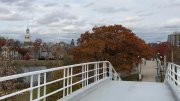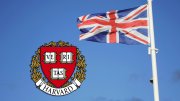Dean of Harvard College Evelynn M. Hammonds has announced the formation of a working group on bisexual, gay, lesbian, and transgender (BGLT) student life. According to the announcement, dated October 4, "[T]he working group will recommend ways to address the needs of BGLT students in a more systematic fashion by fostering better coordination among existing resources and/or the creation of enhanced resources. The working group…will consider a number of important questions about BGLT student experiences including the support for students who experience familial, peer, or cultural challenges as a result of their sexual orientation and/or gender identity. The working group will also explore optimal structures for supporting and enhancing BGLT student life at Harvard College." It is expected to make recommendations to Dean Hammonds in the spring semester.
The dean’s announcement comes at a time when President Drew Faust talked about the Harvard community's openness to formerly shunned populations in her Morning Prayers remarks at the beginning of the fall term. On that occasion, she said:
Two years ago, I attended the twenty-fifth anniversary of the Harvard Gay and Lesbian Caucus, an experience I found deeply moving. Most of these former students were from generations for whom “belonging” at Harvard required closeting and denying their real identities. To come back now as their real selves meant for many to truly belong at Harvard for the first time.
She also noted then, "How can we work both to honor and support the dedication of students who join ROTC and the dignity of gay and lesbian students excluded from it?" In an interview with the Boston Globe on September 22, Faust linked the University's recognition of ROTC on campus with the repeal of the U.S. military's ban on service by openly gay and lesbian personnel (the so-called "don't ask, don't tell" policy).
The membership of the working group is expected to be announced soon. (On October 7, the Crimson reported that the chair will be Susan Marine, assistant dean of the College for student life and director of the Harvard College Women's center, which, the article said, "has sometimes served as an informal hub for the LGBT community.")
The full text of the charge to the working group follows.
Bisexual, gay, lesbian, and transgender (BGLT) students have always been a part of Harvard and Radcliffe’s rich history and have had a significant impact in all walks of campus life. In response to their growing numbers, the College has established numerous programs, resources, and diverse avenues for personal and collective empowerment, including support for CONTACT (a student-run, peer counseling group dedicated to BGLT issues), the establishment of the Queer Resource Center in Holworthy and later Thayer Hall, the BGLT tutor/adviser program in the Freshman Yard and Upperclass Houses, and the designation of a part-time professional counseling position within the University’s Mental Health Services. The Harvard College Women’s Center, established in 2006, has also served as a ‘de facto’ BGLT resource, especially with regard to the coordination of educational programming and BGLT related events.
While each of these programs and services has meaningfully contributed to the sense of belonging and well-being of BGLT students, in recent years, questions have continuously arisen about whether and how these disparate entities might be better coordinated, supported, and deployed in the service of full participation for BGLT students within Harvard College.
The Dean of Harvard College has convened a working group in the 2010 fall semester to consider the following questions, keeping in mind the fiscal landscape for the FAS and College:
1) How are our current support structures for BGLT students effective? How are they lacking?
2) What are the most effective support structure(s) for individuals facing challenges in their BGLT identity development process? Are these present within current student services at the College?
3) What are the most appropriate structures for advising and support of BGLT student organizations?
4) What are the most appropriate structures for support and oversight of the student-run Queer Resource Center?
5) How can the College best coordinate, oversee, support, and provide on-going training to the BGLT specialty tutor and proctor program? Who might best oversee these efforts?
6) What should the coordination and evaluation of educational programming for students on BGLT issues, equity, and identity look like and who should conduct these efforts?
7) How might the College create and enhance meaningful intergenerational partnerships within the existing BGLT student and alumni/ae communities at Harvard?
The membership of this working group, including faculty, staff, and students associated with BGLT life in the College, will examine these questions through meetings during the fall and early spring terms, and will present a confidential set of recommendations to the Dean of the College in March, 2011, for her consideration.








